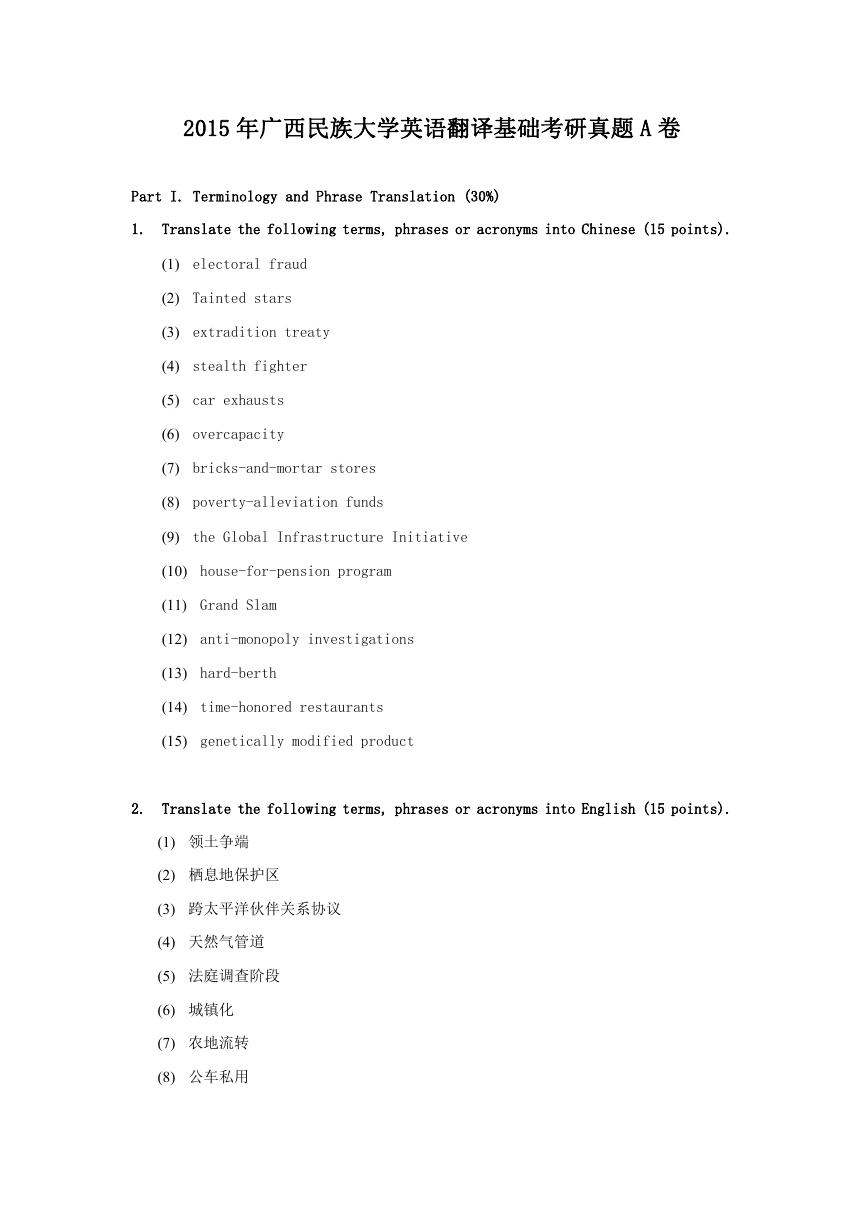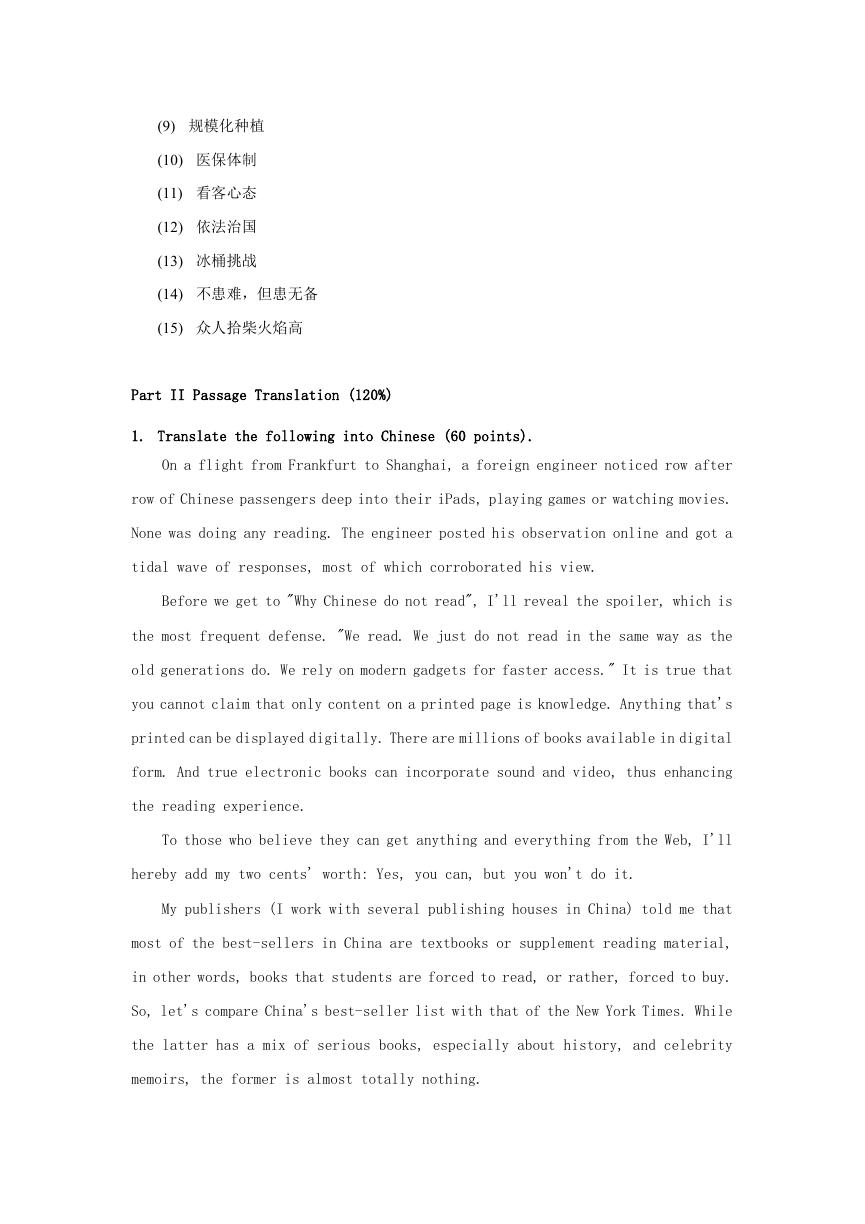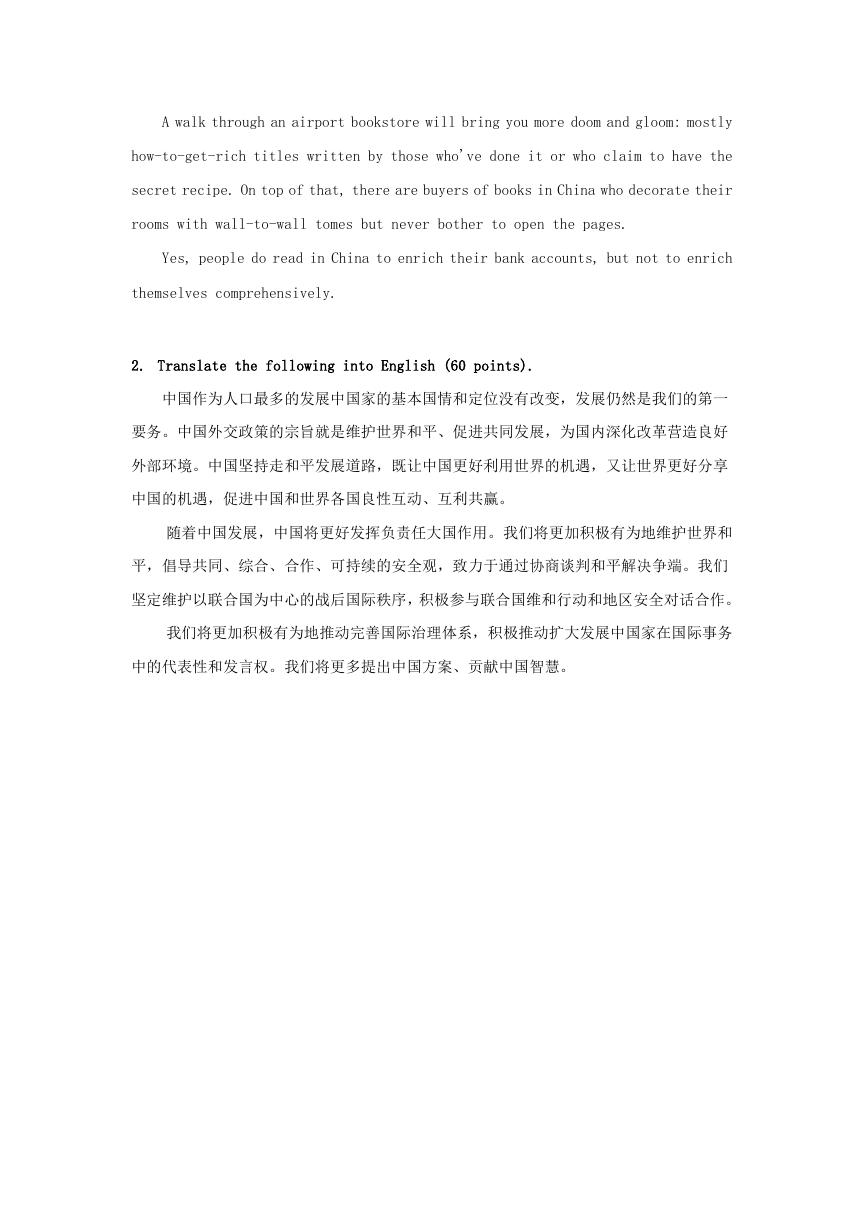2015 年广西民族大学英语翻译基础考研真题 A 卷
Part I. Terminology and Phrase Translation (30%)
1. Translate the following terms, phrases or acronyms into Chinese (15 points).
(1) electoral fraud
(2) Tainted stars
(3) extradition treaty
(4) stealth fighter
(5) car exhausts
(6) overcapacity
(7) bricks-and-mortar stores
(8) poverty-alleviation funds
(9) the Global Infrastructure Initiative
(10) house-for-pension program
(11) Grand Slam
(12) anti-monopoly investigations
(13) hard-berth
(14) time-honored restaurants
(15) genetically modified product
2. Translate the following terms, phrases or acronyms into English (15 points).
(1) 领土争端
(2) 栖息地保护区
(3) 跨太平洋伙伴关系协议
(4) 天然气管道
(5) 法庭调查阶段
(6) 城镇化
(7) 农地流转
(8) 公车私用
�
(9) 规模化种植
(10) 医保体制
(11) 看客心态
(12) 依法治国
(13) 冰桶挑战
(14) 不患难,但患无备
(15) 众人拾柴火焰高
Part II Passage Translation (120%)
1. Translate the following into Chinese (60 points).
On a flight from Frankfurt to Shanghai, a foreign engineer noticed row after
row of Chinese passengers deep into their iPads, playing games or watching movies.
None was doing any reading. The engineer posted his observation online and got a
tidal wave of responses, most of which corroborated his view.
Before we get to "Why Chinese do not read", I'll reveal the spoiler, which is
the most frequent defense. "We read. We just do not read in the same way as the
old generations do. We rely on modern gadgets for faster access." It is true that
you cannot claim that only content on a printed page is knowledge. Anything that's
printed can be displayed digitally. There are millions of books available in digital
form. And true electronic books can incorporate sound and video, thus enhancing
the reading experience.
To those who believe they can get anything and everything from the Web, I'll
hereby add my two cents' worth: Yes, you can, but you won't do it.
My publishers (I work with several publishing houses in China) told me that
most of the best-sellers in China are textbooks or supplement reading material,
in other words, books that students are forced to read, or rather, forced to buy.
So, let's compare China's best-seller list with that of the New York Times. While
the latter has a mix of serious books, especially about history, and celebrity
memoirs, the former is almost totally nothing.
�
A walk through an airport bookstore will bring you more doom and gloom: mostly
how-to-get-rich titles written by those who've done it or who claim to have the
secret recipe. On top of that, there are buyers of books in China who decorate their
rooms with wall-to-wall tomes but never bother to open the pages.
Yes, people do read in China to enrich their bank accounts, but not to enrich
themselves comprehensively.
2. Translate the following into English (60 points).
中国作为人口最多的发展中国家的基本国情和定位没有改变,发展仍然是我们的第一
要务。中国外交政策的宗旨就是维护世界和平、促进共同发展,为国内深化改革营造良好
外部环境。中国坚持走和平发展道路,既让中国更好利用世界的机遇,又让世界更好分享
中国的机遇,促进中国和世界各国良性互动、互利共赢。
随着中国发展,中国将更好发挥负责任大国作用。我们将更加积极有为地维护世界和
平,倡导共同、综合、合作、可持续的安全观,致力于通过协商谈判和平解决争端。我们
坚定维护以联合国为中心的战后国际秩序,积极参与联合国维和行动和地区安全对话合作。
我们将更加积极有为地推动完善国际治理体系,积极推动扩大发展中国家在国际事务
中的代表性和发言权。我们将更多提出中国方案、贡献中国智慧。
�






 2023年江西萍乡中考道德与法治真题及答案.doc
2023年江西萍乡中考道德与法治真题及答案.doc 2012年重庆南川中考生物真题及答案.doc
2012年重庆南川中考生物真题及答案.doc 2013年江西师范大学地理学综合及文艺理论基础考研真题.doc
2013年江西师范大学地理学综合及文艺理论基础考研真题.doc 2020年四川甘孜小升初语文真题及答案I卷.doc
2020年四川甘孜小升初语文真题及答案I卷.doc 2020年注册岩土工程师专业基础考试真题及答案.doc
2020年注册岩土工程师专业基础考试真题及答案.doc 2023-2024学年福建省厦门市九年级上学期数学月考试题及答案.doc
2023-2024学年福建省厦门市九年级上学期数学月考试题及答案.doc 2021-2022学年辽宁省沈阳市大东区九年级上学期语文期末试题及答案.doc
2021-2022学年辽宁省沈阳市大东区九年级上学期语文期末试题及答案.doc 2022-2023学年北京东城区初三第一学期物理期末试卷及答案.doc
2022-2023学年北京东城区初三第一学期物理期末试卷及答案.doc 2018上半年江西教师资格初中地理学科知识与教学能力真题及答案.doc
2018上半年江西教师资格初中地理学科知识与教学能力真题及答案.doc 2012年河北国家公务员申论考试真题及答案-省级.doc
2012年河北国家公务员申论考试真题及答案-省级.doc 2020-2021学年江苏省扬州市江都区邵樊片九年级上学期数学第一次质量检测试题及答案.doc
2020-2021学年江苏省扬州市江都区邵樊片九年级上学期数学第一次质量检测试题及答案.doc 2022下半年黑龙江教师资格证中学综合素质真题及答案.doc
2022下半年黑龙江教师资格证中学综合素质真题及答案.doc